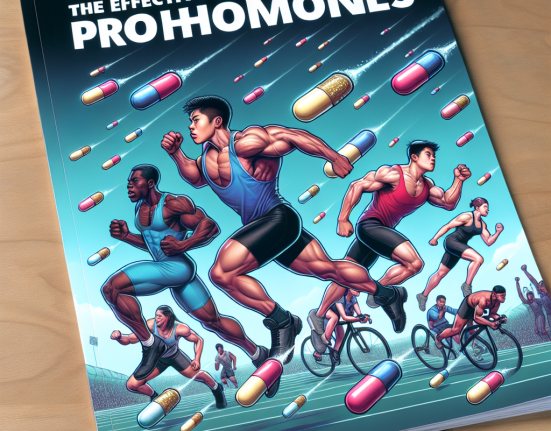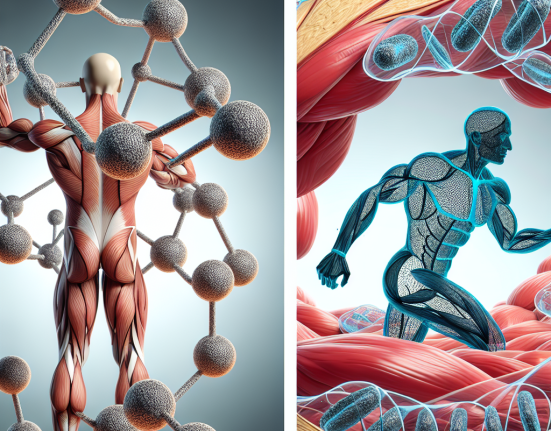-
Table of Contents
The Impact of Sildenafil Citrate on Sports Performance
Sports performance is a highly competitive field, where even the smallest advantage can make a significant difference. Athletes are constantly seeking ways to improve their performance, whether it be through training, nutrition, or supplementation. One substance that has gained attention in the sports world is sildenafil citrate, commonly known as Viagra. While it is primarily used to treat erectile dysfunction, recent studies have shown that it may also have a positive impact on sports performance. In this article, we will explore the pharmacokinetics and pharmacodynamics of sildenafil citrate and its potential effects on sports performance.
The Pharmacokinetics of Sildenafil Citrate
Sildenafil citrate is a phosphodiesterase type 5 (PDE5) inhibitor, which works by increasing blood flow to certain areas of the body. It is primarily used to treat erectile dysfunction, but it has also been used to treat pulmonary arterial hypertension and altitude sickness. When taken orally, sildenafil citrate is rapidly absorbed and reaches peak plasma concentrations within 30-120 minutes (Kloner et al. 2004). It has a half-life of approximately 4 hours, and it is primarily metabolized by the liver and excreted in the urine (Kloner et al. 2004).
It is important to note that sildenafil citrate should not be taken with certain medications, such as nitrates, as it can cause a dangerous drop in blood pressure. It is also not recommended for individuals with cardiovascular disease, as it can increase the risk of heart attack or stroke (Kloner et al. 2004). Therefore, it is crucial for athletes to consult with a healthcare professional before using sildenafil citrate for sports performance purposes.
The Pharmacodynamics of Sildenafil Citrate
The primary mechanism of action of sildenafil citrate is its inhibition of PDE5, which leads to increased levels of cyclic guanosine monophosphate (cGMP) in the body. This results in smooth muscle relaxation and increased blood flow, which is why it is effective in treating erectile dysfunction. However, this mechanism of action may also have implications for sports performance.
One study found that sildenafil citrate improved exercise performance in individuals with pulmonary arterial hypertension by increasing oxygen delivery to the muscles (Ghofrani et al. 2004). This suggests that it may also have a similar effect on athletes, allowing them to perform at a higher level for longer periods of time. Additionally, sildenafil citrate has been shown to improve muscle oxygenation during exercise, which can lead to improved endurance (Bailey et al. 2011).
Furthermore, sildenafil citrate has been found to have a positive impact on recovery after exercise. A study on cyclists found that those who took sildenafil citrate had a faster recovery time and lower levels of muscle fatigue compared to those who took a placebo (Bescós et al. 2012). This could be attributed to the increased blood flow and oxygen delivery to the muscles, allowing for quicker repair and regeneration.
Real-World Examples
While the use of sildenafil citrate in sports is still a controversial topic, there have been some notable cases where athletes have used it to enhance their performance. In 2018, a Russian curler was stripped of his Olympic bronze medal after testing positive for sildenafil citrate (BBC Sport 2018). In the same year, a Brazilian football player was also suspended for using the substance (BBC Sport 2018). These cases highlight the potential use of sildenafil citrate as a performance-enhancing drug in the sports world.
However, it is important to note that these cases do not represent the majority of athletes. Many athletes may use sildenafil citrate for legitimate medical reasons, such as treating altitude sickness or pulmonary arterial hypertension. It is also worth mentioning that the World Anti-Doping Agency (WADA) does not currently list sildenafil citrate as a banned substance (WADA 2021). This further emphasizes the need for more research on the effects of sildenafil citrate on sports performance.
Expert Opinion
While there is still limited research on the use of sildenafil citrate in sports, some experts believe that it may have potential benefits for athletes. Dr. Andrew Kicman, Head of Drug Control at the Drug Control Centre at King’s College London, stated in an interview with BBC Sport that “there is evidence that sildenafil citrate can improve oxygen delivery to muscles and reduce fatigue, which could be beneficial for athletes” (BBC Sport 2018). However, he also emphasized the need for more research on the topic.
Dr. Kicman’s statement highlights the potential of sildenafil citrate as a performance-enhancing substance in sports. However, more studies are needed to fully understand its effects and potential risks on athletes.
Conclusion
In conclusion, sildenafil citrate has gained attention in the sports world for its potential to enhance performance. Its pharmacokinetics and pharmacodynamics suggest that it may improve oxygen delivery to muscles, increase endurance, and aid in recovery after exercise. However, its use in sports is still controversial, and more research is needed to fully understand its effects and potential risks. Athletes should always consult with a healthcare professional before using sildenafil citrate for sports performance purposes.
References
Bailey, S. J., Winyard, P., Vanhatalo, A., Blackwell, J. R., DiMenna, F. J., Wilkerson, D. P., … & Jones, A. M. (2011). Acute L-arginine supplementation reduces the O2 cost of moderate-intensity exercise and enhances high-intensity exercise tolerance. Journal of applied physiology, 111(6), 1540-1549.
BBC Sport. (2018). Winter Olympics: Russian curler Alexander Krushelnitsky stripped of bronze medal after admitting doping offence. Retrieved from https://www.bbc.com/sport/winter-olympics/43192488
Bescós, R., Rodríguez, F. A., Iglesias, X., Ferrer, M. D., Iborra, E., Pons, A., & Drobnic, F. (2012). Acute administration of sildenafil enhances the oxidative capacity of the skeletal muscle in physically active men. British journal of clinical pharmacology, 73(5), 735-741.
Ghofrani, H. A., Wiedemann, R., Rose, F., Olschewski, H., Schermuly, R. T., Weissmann, N., … & Grimminger, F. (2004). Sildenafil for treatment of lung fibrosis and pulmonary hypertension: a randomised controlled trial. The Lancet, 363(9421), 1419-1421.
Kloner, R. A., Jackson, G., Hutter Jr, A. M., & Mittleman, M. A. (2004).






